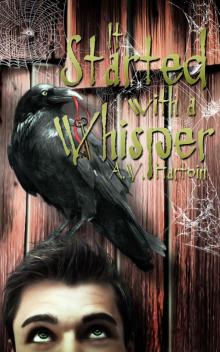 A Monster's Paradise (Away From Whipplethorn Book Three)
A Monster's Paradise (Away From Whipplethorn Book Three) A Sin and a Shame (A Mercy Watts Short)
A Sin and a Shame (A Mercy Watts Short) Fierce Creatures (Away From Whipplethorn Book Two)
Fierce Creatures (Away From Whipplethorn Book Two) Strangers in Venice
Strangers in Venice Mean Evergreen (Mercy Watts Mysteries Book Twelve)
Mean Evergreen (Mercy Watts Mysteries Book Twelve) Down and Dirty (Mercy Watts Mysteries Book 9)
Down and Dirty (Mercy Watts Mysteries Book 9) Small Time Crime (Mercy Watts Mysteries Book 10)
Small Time Crime (Mercy Watts Mysteries Book 10) It Started with a Whisper
It Started with a Whisper My Bad Grandad
My Bad Grandad A.W. Hartoin - Mercy Watts 04 - Drop Dead Red
A.W. Hartoin - Mercy Watts 04 - Drop Dead Red Brain Trust
Brain Trust In the Worst Way (Mercy Watts Mysteries Book 5)
In the Worst Way (Mercy Watts Mysteries Book 5) Diver Down (Mercy Watts Mysteries)
Diver Down (Mercy Watts Mysteries) Nowhere Fast (A Mercy Watts Short)
Nowhere Fast (A Mercy Watts Short) Touch and Go (A Mercy Watts Short)
Touch and Go (A Mercy Watts Short) The Wife of Riley (Mercy Watts Mysteries Book 6)
The Wife of Riley (Mercy Watts Mysteries Book 6) A Good Man Gone (Mercy Watts Mysteries)
A Good Man Gone (Mercy Watts Mysteries) The Wife of Riley
The Wife of Riley A Fairy's Guide to Disaster
A Fairy's Guide to Disaster Coke with a Twist (A Mercy Watts short)
Coke with a Twist (A Mercy Watts short) Dry Spell: A Mercy Watts Short
Dry Spell: A Mercy Watts Short